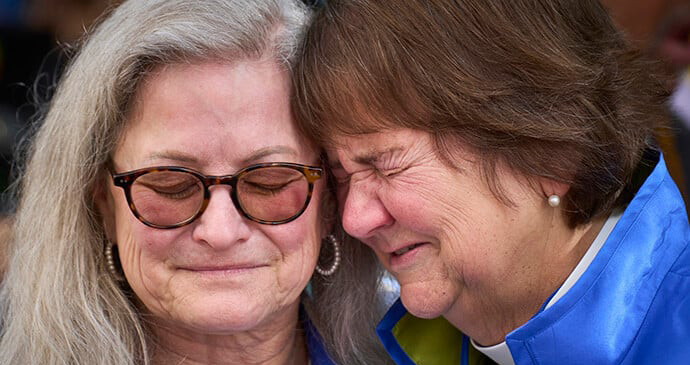After 40 years of wrangling and rancor, delegates to the postponed 2020 United Methodist General Conference overwhelmingly removed the ban on ordaining “self-avowed, practicing homosexuals” as clergy.
The vote was 692 for and 51 against to approve the consent calendar containing the petitions.
No United Methodist church will be forced to accept an LGBTQ pastor or to perform same-gender weddings. Those decisions are now left to the discretion of local churches and annual (regional) conferences.
Delegates also removed a ban on United Methodist clergy performing marriages for same-sex couples, which is legal in the United States and other countries where United Methodists are located.
Gone from United Methodist law is Paragraph 304.3, which read: “While persons set apart by the Church for ordained ministry are subject to all the frailties of the human condition and the pressures of society, they are required to maintain the highest standards of holy living in the world. The practice of homosexuality is incompatible with Christian teaching. Therefore self-avowed practicing homosexuals are not to be certified as candidates, ordained as ministers, or appointed to serve in The United Methodist Church.”
The vote was 692 for and 51 against to approve the consent calendar containing the petitions.
The addition of two paragraphs to the same section eliminates the prohibition on same-sex weddings being conducted in local churches.
Both actions go into effect at the close of General Conference on May 3.
Whoops of joy and applause broke out in the Charlotte Convention Center’s Hall B when the consent calendar containing the repeals was adopted. Proceedings continued as groups of yellow-clad and rainbow-bedecked supporters wept and hugged one another at the removal of the phrase “self-avowed, practicing homosexual” from ministry disqualifications.
At the morning break, about 200 people gathered in a courtyard outside the convention center under rainbow-striped umbrellas, rejoicing to the beat of a conga drum played by noted United Methodist worship consultant Marcia McFee.
“Now we have work to do,” McFee said as she led the group in giving one another personal accounts of their obstacles on the way to ordained ministry. “Legislation doesn’t equal behavior all the time.”
Bridget Cabrera, executive director of Methodist Federation for Social Action, said, “Everything is still just sinking in from a personal perspective. I became a member of the United Methodist Church because it was the first place that loved me and cared for me. After being bullied as a child for being a little different because of my biracial background, my United Methodist Church was always a constant place of welcome and love. I felt my call to ministry (in the UMC) and went to seminary and there I fell in love with my wife and did not go forward with the ordination process.
“So, I personally know the incompatibility clause is the place in our discipline where all the other prohibitions hang from,” Cabrera said. “I’m just very, very overwhelmed.”
Remaining on the agenda as of noon May 1 was the adoption of the final part of the Revised Social Principles, where the dictum “the practice of homosexuality is incompatible with Christian teaching” has spawned the multiple restrictions and penalties that run throughout the Book of Discipline, the collection of United Methodist laws.
The Revised Social Principles make little mention of human sexuality except to condemn sexual abuse of any person. The document defines marriage as “a union of two people of faith” rather than a current description of “between a man and a woman.”
The Revised Social Principles benefitted from delegates’ adoption of worldwide regionalization. Restructuring the UMC into roughly continental areas will give them the authority to set ordination standards and marriage rites according to their own contexts. Regionalization requires constitutional amendments to be approved by two-thirds of United Methodist units known as annual conferences worldwide and will take years to approve or reject.
The General Conference also approved the creation of a study committee to draft what will be called the General Discipline, which will contain unchangeable doctrine and organization requirements.
Related articles:
UMC General Conference removes much of LGBTQ restrictions in consensus vote
UMC gives first approval to restructuring plan
Top issues for United Methodists’ Global Assembly taking shape
One quarter of U.S. United Methodist churches have disaffiliated
United Methodists will decide realigning church’s structure, authority in 2024

